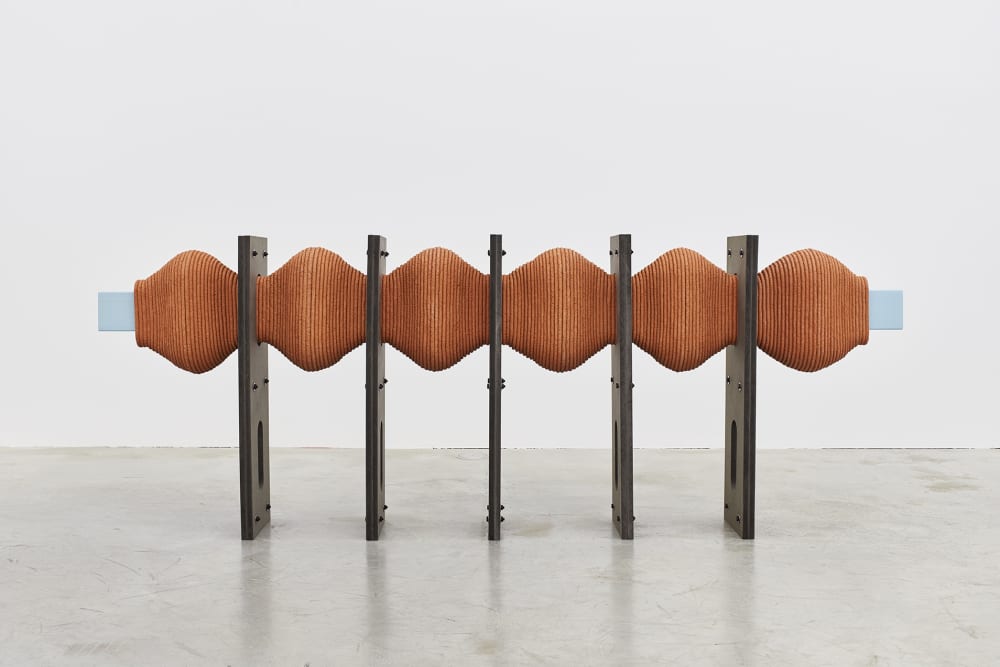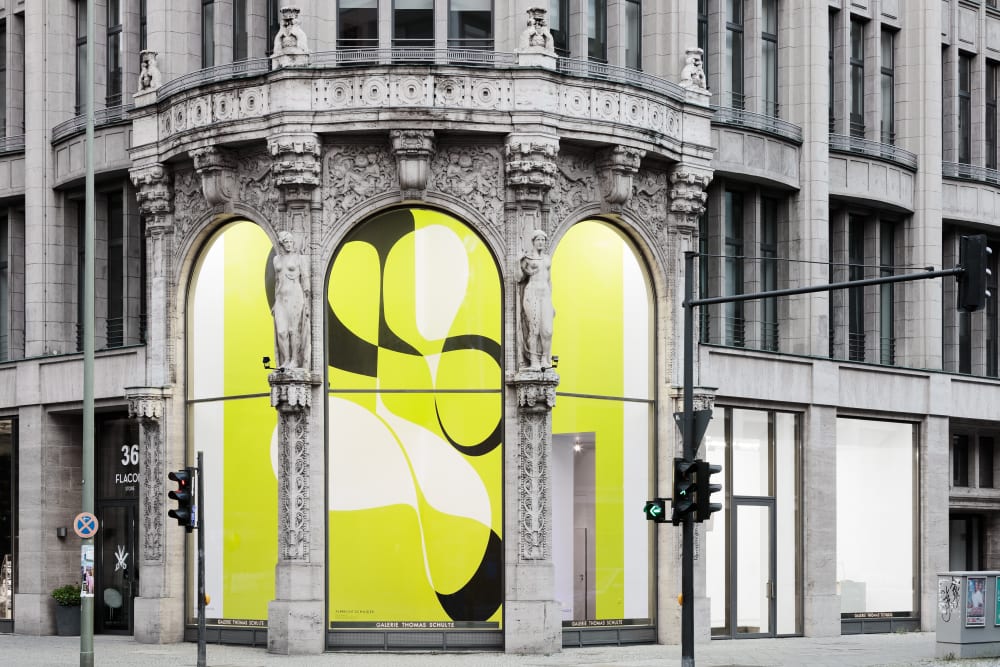Leunora Salihu, Albrecht Schnider: A PLANT. A PERSON. A LIFE.
-
Introduction
Galerie Thomas Schulte presents a duo exhibition featuring sculptures by Leunora Salihu and paintings by Albrecht Schnider. In A Plant. A Person. A Life.—titled after a poem by Schnider—the works broach classical themes and questions of sculpture and painting, respectively, each from a direction entirely their own. Though rooted in life, in living things and everyday forms, the seemingly familiar becomes estranged. Structural yet full of motion, the works unfold through repetition and chance encounters: a constructed nature that invites existential wanderings.
Two interconnected motifs slowly surface in Schnider’s paintings: flowers and plants and allusions to portraiture. Through a principle of reduction and a balance between control and the accidental, his images verge on the representational, while touching only the edge of it. Though we might quickly recognize faces or heads filling the canvas, just as quickly, they dissolve into the background, into something else. At times, the images merge both floral and human forms in a single composition. In a new painting, for example, a green leafy stem is vertically superimposed over the smooth contours of a white silhouette, like a skull seen in profile. A pink flower bud opens directly over what could be an eye. The relationship between the form of the flower and that of the eye is one that is foregrounded throughout—between figurative and ornamental, at once elegant and unsettling. It is as though one holds a mirror up to the other: a reminder of its own transience.
Mortality is in tension with a suggestion of timelessness. Schnider’s process is meticulous; he spends time with his paintings, executing quick, fluid gestures alongside moments of still observation. He often uses a wide, self-made spatula to move paint along the surface, at times wiping away and beginning again, working with the medium in a direct, unmediated way to bring the image to form. Here, durational consistency is also conveyed by a selection of earlier works, through which his long-standing thematic concerns can be traced. In paintings of a more sculptural nature, a sense of permanence particularly comes through, as though depicting portrait busts.
In a recent painting, a base standing centrally along the bottom edge tapers up to support a vaguely head-shaped form. Largely white, off-white, and greyish with dark outlines and a monochrome background, the composition is given a certain depth. On top of what resembles a head gracefully turned at an angle, ribbon-like swirls stand in for hair. Even with its stoney coloration and pedestal that feels firmly planted, the entire form suggests a twister—tumultuous, as though about to spiral out and away from the canvas. The supposed face is a constellation of potential features, layered and indistinct, at once ghostly and almost cartoonish. Similarly sculptural in appearance, a recent lithograph features a cluster of silver-grey roses, simplified round shapes, that fill the surface, connected by stems that move fluidly in different directions – an echo of those in two earlier paintings, Ohne Titel (Study VII & VIII), 2015. The folds of petals are given basic shape through spirals of darker and lighter shades—a chaotic though controlled, gradual motion, indicating growth or change, receding or protruding.
Through the interplay of openings and enclosures, in and out, like the rhythm of breath, such motions and regularity also come to form in Salihu’s work. The small-scale work Insel (2025) is likewise made up of circular forms. Vertically stacked on a rounded, oblong plaque, two horn-like protrusions emerge with centered openings. In contrast to the smooth, reflective gold glaze of the base—which lends it a sense of softness and pliability—the dark, matte conical forms have a rougher, slightly irregular texture. Viewed from the side, the sculpture reveals its depth: the dark cones project assertively outward, evoking industrial nozzles or organic growths.
In different scales, standing, suspended or attached to the wall, Salihu’s sculptures carry bodily and architectural references through varied materials: from wood and ceramic to plaster and iron, at times brought into direct interaction with one another. With repeated and modular forms, she engages construction processes that incorporate both a thoughtful, deliberate approach to her materials, as well as a degree of spontaneity in their expressive abilities. This duality features prominently on several levels in her work, striking a careful balance through complex sculptural considerations and their connection to the body and its surroundings. Dwelling—the relationship between living and space—is a particular concern that comes through in different references to both protective coverings and inner worlds, and the emotional weight they may carry.
This is illustrated in Säule (2011), which consists of two white, elongated architectural forms placed horizontally on the floor. One is a solid form comprising visible horizontal segments; it twists, like a screw or a strand of DNA—relating to building blocks and construction processes, while also bone-like, resembling a spine. The second is a rectangular column that lies flat and stable, with a space opening through its hollowed-out center, potentially offering either support or encasement for the other. These are placed parallel to one another, with space in between, and assume a human, rather than monumental, scale, while the possibility remains that the forms could be repeated or continue extending into space. Similarly, in a new work, a ceramic and wood sculpture titled Spine I (2025), the spinal column rises vertically, like an active body. The smooth regularity of its stacked vertebrae and rigid, upright position is offset by the apparent flexibility of flesh-like terracotta. Depending on vantagepoint, it might also resemble an insect’s exoskeleton, or possibly even a chest of drawers: conveying uncertainty in both function and vitality. As is characteristic of Salihu’s work, it seems suspended between different states of existence—at once internal and external, mobile and static. Its presence could be enduring, or only momentary.
Across the works on view, there is a quiet search—for form, guided by material and process—whether in Salihu’s rhythmic structures and bodily engagement with space, or Schnider’s considered approach to painterly abbreviations. Evocative and intimate, yet remote, A Plant. A Person. A Life. makes a concrete gesture towards something abstract—where the fleeting becomes a source of continuity.
Text by Julianne Cordray
-
Installation Views
-
Works
-
Inquire about works by Leunora Salihu and Albrecht Schnider
-
Artists on view
















